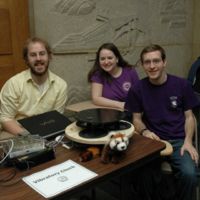Difference between revisions of "Vibratory Clock"
From Mech
Jump to navigationJump to searchm (→Team Members) |
|||
| Line 9: | Line 9: | ||
==Overview== |
==Overview== |
||
We built a horizontal circular platform that is actuated from underneath by three speakers. The vibration of the platform causes a small object (e.g., |
We built a horizontal circular platform that is actuated from underneath by three speakers placed in an equilateral triangle. The vibration of the platform causes a small object (e.g., an IC socket or a coin) to act as an hour "hand" on top of the platform. The object slides around the circular platform, impelled by friction forces due to the vibration. By placing the speakers at different phases and amplitudes, we got the objects to move to desired positions. Due to the nodes created by the speaker vibrations, the object will move back to the correct hour if it is moved away. Our project was given to us by Professor Colgate and was based upon the research of Professor Lynch. |
||
==Mechanical Design== |
==Mechanical Design== |
||
Revision as of 12:06, 19 March 2008
Team Members
- Jennifer Breger - Mechanical Engineering Class of 2009
- Brian Lesperance - Electrical Engineering Class of 2008
- Daniel Pinkawa - Mechanical Engineering Class of 2008
Overview
We built a horizontal circular platform that is actuated from underneath by three speakers placed in an equilateral triangle. The vibration of the platform causes a small object (e.g., an IC socket or a coin) to act as an hour "hand" on top of the platform. The object slides around the circular platform, impelled by friction forces due to the vibration. By placing the speakers at different phases and amplitudes, we got the objects to move to desired positions. Due to the nodes created by the speaker vibrations, the object will move back to the correct hour if it is moved away. Our project was given to us by Professor Colgate and was based upon the research of Professor Lynch.
